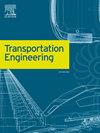Eco-driving optimal control for electric vehicles with driver preferences
Q1 Engineering
引用次数: 0
Abstract
An optimal control formulation of an eco-driving system for front-wheel drive electric vehicles is proposed in this paper, demonstrating that including an optimal control model of driver preferences in such systems can successfully blend the objective of energy-efficiency with the subjective goals of human drivers, including desired following distances and time headways, a desired vehicle speed, smooth vehicle acceleration, and a comfortable corner negotiation speed. This builds on previous works that developed driver preference models for optimal control, but did not apply them to a realistic model of an EV powertrain to evaluate potential energy savings in practice. The resulting optimal control problem (OCP) is simplified for implementation by using a polynomial approximation of vehicle losses, and a relaxation of regenerative braking constraints that accurately accounts for required braking bias in a front-wheel drive vehicle. In testing, over a simulated 25km journey involving rural, motorway and urban sections, blending driver preferences with energy efficiency in this framework achieves energy savings of 21% with only a 7% decrease in average speed. For car-following scenarios, 10–15% energy savings are achievable with no decrease in average speed.
求助全文
约1分钟内获得全文
求助全文
来源期刊

Transportation Engineering
Engineering-Automotive Engineering
CiteScore
8.10
自引率
0.00%
发文量
46
审稿时长
90 days
 求助内容:
求助内容: 应助结果提醒方式:
应助结果提醒方式:


